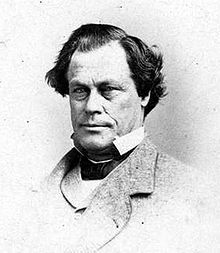Owen Lovejoy
| Owen Lovejoy | |
|---|---|
 |
|
| Member of the U.S. House of Representatives from Illinois's 5th district |
|
|
In office March 4, 1863 – March 25, 1864 |
|
| Preceded by | William A. Richardson |
| Succeeded by | Ebon C. Ingersoll |
| Member of the U.S. House of Representatives from Illinois's 3rd district |
|
|
In office March 4, 1857 – March 3, 1863 |
|
| Preceded by | Jesse O. Norton |
| Succeeded by | Elihu B. Washburne |
| Personal details | |
| Born |
January 6, 1811 Albion, Maine, U.S. |
| Died | March 25, 1864 (aged 53) Brooklyn, New York, New York, U.S. |
| Political party | Republican |
| Spouse(s) | Eunice Lovejoy |
| Relations | Nathan A. Farwell (cousin) |
| Residence | Princeton, Illinois |
| Alma mater | Bowdoin College |
| Occupation | Minister |
| Religion | Congregationalist |
| Website | http://bioguide.congress.gov/scripts/biodisplay.pl?index=L000462 |
Owen Lovejoy (January 6, 1811 – March 25, 1864) was an American lawyer, Congregational minister, abolitionist, and Republican congressman from Illinois. He was also a "conductor" on the Underground Railroad. After his brother Elijah Lovejoy was murdered in November 1837 by pro-slavery forces, Owen, a friend of Abraham Lincoln, became a leader of abolitionists in Illinois, condemning slavery and assisting runaway slaves in escaping to freedom.
Born in Albion, Maine in 1811, Lovejoy was one of five brothers born to Emma and Patee Lovejoy, a Congregational minister and farmer. He worked with his family on the farm until he was 18, and his parents encouraged his education. His father was a Congregational minister and his mother was very devout. Lovejoy graduated from Bowdoin College in 1832. He studied law, but never practiced.
Lovejoy migrated to Alton, Illinois, where his older brother Elijah Parish Lovejoy had moved in 1836 from St. Louis, because of hostility to his anti-slavery activities. The older Lovejoy was by then an anti-slavery Presbyterian minister who edited the Alton Observer, an abolitionist newspaper. The younger brother studied theology there.
Owen was present on the night of November 7, 1837 when his brother Elijah was murdered while trying to defend the printing press of the Illinois Anti-Slavery Society from an angry mob. He is reported to have sworn on his brother's grave to "never forsake the cause that had been sprinkled with my brother's blood." Owen and his brother Joseph C. Lovejoy wrote Memoir of Elijah P. Lovejoy (1838), which was distributed widely by the American Anti-Slavery Society, increasing Elijah's fame after his death and adding to the abolition cause.
Lovejoy served as pastor of the Congregational Church in Princeton, Illinois from 1838–1856. During these years, he also organized a number of the 115 anti-slavery Congregational churches in Illinois begun by the American Missionary Association, founded in 1846. His activities brought him increasing public prominence.
...
Wikipedia
